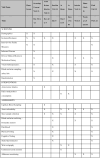Rationale and protocol for a safety, tolerability and feasibility randomized, parallel arm, double-blind, placebo-controlled, pilot study of a novel ketone ester targeting frailty via immunometabolic geroscience mechanisms
- PMID: 39292659
- PMCID: PMC11410252
- DOI: 10.1371/journal.pone.0307951
Rationale and protocol for a safety, tolerability and feasibility randomized, parallel arm, double-blind, placebo-controlled, pilot study of a novel ketone ester targeting frailty via immunometabolic geroscience mechanisms
Abstract
Background: Frailty is a geriatric syndrome characterized by chronic inflammation and metabolic insufficiency that creates vulnerability to poor outcomes with aging. We hypothesize that interventions which target common underlying mechanism of aging could ameliorate frailty. Ketone bodies are metabolites produced during fasting or on a ketogenic diet that have pleiotropic effects on inflammatory and metabolic aging pathways in laboratory animal models. Ketone esters (KEs) are compounds that induce ketosis without dietary changes, but KEs have not been studied in an older adult population. Our long-term goal is to examine if KEs modulate aging biology mechanisms and clinical outcomes relevant to frailty in older adults.
Objectives: The primary objective of this randomized, placebo-controlled, double-blinded, parallel-group, pilot trial is to determine tolerability of 12-weeks of KE ingestion in a broad population of older adults (≥ 65 years). Secondary outcomes include safety and acute blood ketone kinetics. Exploratory outcomes include physical function, cognitive function, quality of life, aging biomarkers and inflammatory measures.
Methods: Community-dwelling adults who are independent in activities of daily living, with no unstable acute medical conditions (n = 30) will be recruited. The study intervention is a KE or a taste, appearance, and calorie matched placebo beverage. Initially, acute 4-hour ketone kinetics after 12.5g or 25g of KE consumption will be assessed. After collection of baseline safety, functional, and biological measurements, subjects will randomly be allocated to consume KE 25g or placebo once daily for 12-weeks. Questionnaires will assess tolerability daily for 2-weeks, and then via phone interview at bi-monthly intervals. Safety assessments will be repeated at week 4. All measures will be repeated at week 12.
Conclusion: This study will evaluate feasibility, tolerability, and safety of KE consumption in older adults and provide exploratory data across a range of aging-related endpoints. This data will inform design of larger trials to rigorously test KE effects on aging mechanisms and clinical outcomes relevant to frailty.
Copyright: © 2024 Stubbs et al. This is an open access article distributed under the terms of the Creative Commons Attribution License, which permits unrestricted use, distribution, and reproduction in any medium, provided the original author and source are credited.
Conflict of interest statement
The principal investigator (Dr. Newman), Dr. Brianna Stubbs, and the Buck Institute hold shares in BHB Therapeutics. Drs. Newman and Stubbs are inventors on patents relating to the use of ketone bodies that are assigned to The Buck Institute. All other authors have no conflicts to declare. Individual and institutional extensive conflict management plans were developed and approved by the Buck Institute and the IRB. Actions and decisions important to subject safety and study integrity are carried out by parties with no potential financial conflict. Participant consent is obtained by licensed registered nurses who have no financial conflict. Decisions on subject enrollment, continuation, and discontinuation are made by independent medical officers unaffiliated with Buck Institute and with no financial conflict. Data analysis for the primary outcome is carried out by an independent statistician with no financial conflict. Study staff, including the principal investigator, will maintain blinding through study completion unless unblinding is required for safety concerns. The principal investigator (Dr. Newman), Dr. Brianna Stubbs, and the Buck Institute hold shares in BHB Therapeutics. Drs. Newman (US 11,773,051 B2, US 11,608,306 B2) and Stubbs (US 11,645,228 B2) are inventors on patents relating to the use of ketone bodies that are assigned to The Buck Institute. This does not alter our adherence to PLOS ONE policies on sharing data and materials. All other authors have no conflicts to declare.
Figures
Update of
-
Rationale and protocol for a safety, tolerability and feasibility randomized, parallel group, double-blind, placebo-controlled, pilot study of a novel ketone ester targeting frailty via immunometabolic geroscience mechanisms.medRxiv [Preprint]. 2023 Oct 26:2023.10.25.23297571. doi: 10.1101/2023.10.25.23297571. medRxiv. 2023. Update in: PLoS One. 2024 Sep 18;19(9):e0307951. doi: 10.1371/journal.pone.0307951. PMID: 37961234 Free PMC article. Updated. Preprint.
References
Publication types
MeSH terms
Substances
Grants and funding
LinkOut - more resources
Full Text Sources
Medical



